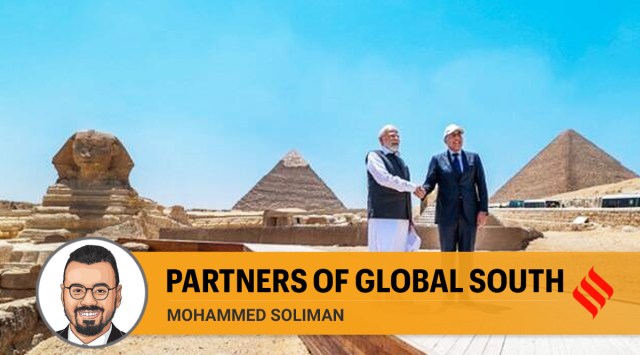
Prime Minister Narendra Modi’s visit to Egypt marks a significant moment in bilateral relations as it is the first visit by an Indian Prime Minister since 1997. The visit comes on the heels of President Abdel Fattah El-Sisi’s state visit to Delhi earlier this year, which elevated the Egypt-India relationship to a strategic partnership. This renewed partnership holds immense regional and global implications, offering India the opportunity to strengthen its presence in Africa and enhancing Egypt’s position in global supply chains. Additionally, it provides a platform for India to showcase its defence capabilities while supporting Egypt in building its own indigenous defence industry.
The collaboration between Egypt and India represents a departure from the non-alignment policy of the Cold War era. It empowers both nations to expand their economic and geopolitical influence, allowing India to exert significant leverage on the global stage. Egypt’s rising stature in Africa and the strategic importance of the Suez Canal further enhance its role in global geopolitics and trade.
India recognises the paramount significance of the Suez Canal for its trade, connectivity, and maritime security prospects. The partnership enables India to fortify its economic ties, extend its global reach, and safeguard its maritime interests.
In the midst of India’s burgeoning economic influence, characterised by its ascent as the world’s most populous nation and the fifth largest economy, surpassing its erstwhile coloniser, the United Kingdom, Egypt, positioned as the second largest economy in Africa and vying to replace Nigeria in the top spot, emerges as a prospective nucleus for trade and manufacturing activities, fostering an indispensable gateway for Delhi to access Africa markets under the umbrella of the African Continental Free Trade Area.
Establishing Indian industrial zones in the strategic Suez Canal region would facilitate seamless connectivity and enhance Egypt’s pivotal role in international commerce. This would enable India to bring its manufacturing capabilities to Africa’s expanding markets, covering various sectors such as electric vehicles, pharmaceuticals, and electronics.
Egypt’s proactive approach to cultivating strong relationships with key African nations has been instrumental in Cairo’s strategic vision for Africa. Through diplomatic finesse, military collaboration, intelligence exchange, and economic cooperation with nations such as Burundi, Kenya, South Sudan, Congo, Ghana, Tanzania, Angola, Zambia, Mozambique and Uganda, Egypt has solidified its standing as a consequential force within the continent. By forging the Cairo-Delhi axis, India can build on Egypt’s expanding presence in Africa and elevate its own position on the global stage.
Both Egypt and India represent emerging voices in the Global South, challenging the prevailing great power competition framework. They reject the notion of a world order solely shaped by major powers like the United States, Russia, and China. India has actively pursued partnerships with like-minded nations, including Indonesia, Turkey, Saudi Arabia, and Brazil, aiming to establish a distinct third pole within the G20 and carve out a middle ground between the West, Russia, and China. Similarly, Egypt has positioned itself as a prominent advocate for the Global South, particularly in Africa, further amplifying its influence and international stature. COP27 provided Egypt with a valuable opportunity to enhance its global standing, reinforce its Afro-Arab identity, and establish itself as a vital bridge-builder between the Global South and North, East, and West. This pivot commenced during Egypt’s presidency of the African Union (AU) in 2019, which served as a platform for Cairo to extend its footprint beyond the Nile Basin and North Africa.
Egypt’s pursuit of a self-reliant defence industry aligns with India’s defence capabilities, offering an alternative to Western and China/Russia options. Egypt’s interest in acquiring the Tejas LCA Mk-1A aircraft from India opens avenues for collaboration in the aviation sector and paves the way for Egypt to develop its own defence industry, with particular emphasis on the aviation sector. With its network of defence alliances with African nations, Egypt could serve as a pivotal gateway for India to expand its defence capabilities and access significant markets, particularly in Africa.
The Egypt-India partnership holds tremendous regional and global significance. It strengthens India’s foothold in Africa, enhances Egypt’s position in the global supply chain, and provides a platform for India to showcase its defence capabilities while supporting Egypt’s defence industry development. This partnership marks a departure from the non-alignment mindset of the past, enabling both nations to expand their economic and geopolitical influence. India gains increased leverage on the global stage, while Egypt solidifies its prominence in Africa and leverages the strategic importance of the Suez Canal in global geopolitics and geoeconomics.
The writer is director, Middle East Institute, Washington